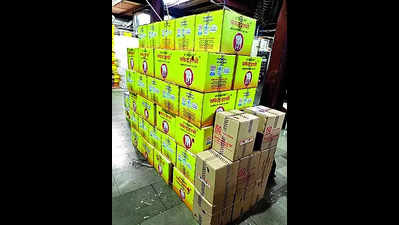- News
- City News
- vadodara News
- Reduce GST on ghee to curb adulteration: IDA urges GOI
Trending
Reduce GST on ghee to curb adulteration: IDA urges GOI

Representations from dairy sector players to the Central govt state that ironically imported palm oil, which is chemically hydrogenated, attracts just 5% GST compared to ghee which since ancient times has been known for its health benefits.
Palm oil is widely used for adulteration of ghee in the Indian market.
A representation from the Indian Dairy Association (IDA) and the Gujarat Co-operative Milk Marketing Federation (Amul Fed) states that if GST on ghee is reduced, it will benefit both consumers and dairy farmers in the country.
“It does not make any sense to higher tax on a pure natural fat produced by 80 million dairy farmers of India, whereas an import commodity attracts lower tax. Besides, ghee is a healthy alternative to palm oil. We have requested the government to examine this matter and to make tax on ghee at par with that of other edible oils,” said IDA president R S Sodhi.
“Cheaper palm oil has resulted in adulteration by small traders and there is almost a parallel business which is being run. By reducing GST on ghee, the govt can save upon tax evasion, increase the income of farmers and at the same time help improve the health of citizens at large,” he said.
Sources said GCMMF in its representations before the centre too has argued that ghee is a staple in Indian households, deeply rooted in India’s cultural and culinary traditions.
“Reducing GST on ghee from 12% to an earlier rate of 5% would make it more affordable for the common man and boost its consumption which is a healthier option than vegetable oil,” Amul has said in its representation. The move will directly benefit dairy farmers by increasing demand for milk and providing them with better prices for their produce, it added. “A lower GST rate will encourage unorganized players and grey market players to comply with GST law resulting in substantial GST revenue collection and possibly to recover foregone revenue. It will also help to reduce the adulteration in ghee. This will reduce the country’s import bill of vegetable oil resulting in saving of foreign exchange,” Amul’s representation to the centre states.
We also published the following articles recently
GST reduced debt, prevented jump in other taxes: Sawant
GST collections have played a crucial role in sustaining Goa's economy, particularly benefiting tourism and small-scale industries. Despite challenges like tax hikes, the efficient tax system has prevented increases, ensuring sustained infrastructure spending and economic growth.
GST collections have played a crucial role in sustaining Goa's economy, particularly benefiting tourism and small-scale industries. Despite challenges like tax hikes, the efficient tax system has prevented increases, ensuring sustained infrastructure spending and economic growth.
Indias palm oil use rises to 38% of total edible oil consumption: APOA
Solidaridad Asia collaborates with Indian farmers to counter misconceptions about palm oil's health and environmental impacts, crucial for the industry's reputation and the Indian economy.
Solidaridad Asia collaborates with Indian farmers to counter misconceptions about palm oil's health and environmental impacts, crucial for the industry's reputation and the Indian economy.
Seven years of GST saw reduced prices of daily consumables
The GST system features a single return process, free flow of goods, and check posts removal, ensuring compliance simplification and efficiency in tax processes.
The GST system features a single return process, free flow of goods, and check posts removal, ensuring compliance simplification and efficiency in tax processes.
End of Article
FOLLOW US ON SOCIAL MEDIA











